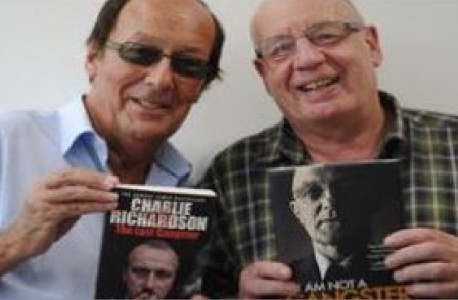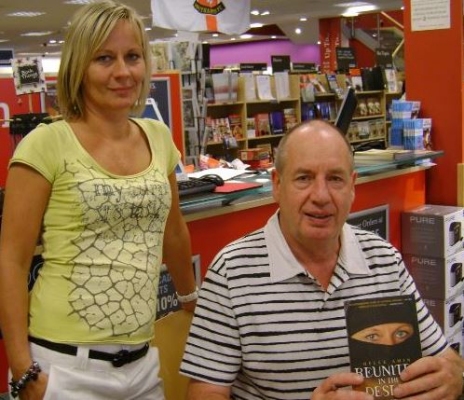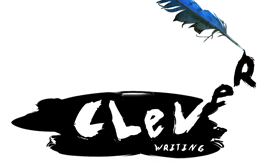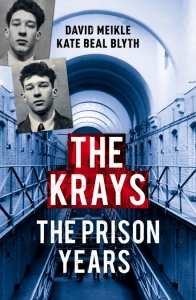





I’m David Meikle, an author from Winchester in Hampshire. My first book was Reunited in the Desert, with publisher John Blake, in 2007/8. I am the ghostwriter for Charlie Richardson, The Last Gangster (Random House), 2014; Doctor’s Notes (Headline), 2014; and I Am Not A Gangster (Ebury, Random House), 2014. The paperback version of I Am Not A Gangster was published in June 2015. Charlie Richardson, The Last Gangster, reached number 3 in the Sunday Times bestseller list. I recently completed The Parkhurst Years and The Krays: The Prison Years. The Krays hardback was released in June 2017, and the paperback in November 2017. The paperback was released in other countries including Canada, Australia and New Zealand in 2018.
The Krays: The Prison Years was compiled with successful documentary maker Kate Beal Blyth, who produced the highly successful programme of the same name for the Discovery Channel.
https://www.penguin.co.uk/authors/108/1080171/david-meikle.html
The book is on sale worldwide:
https://www.penguinrandomhouse.ca/authors/2148893/david-meikle
I recently completed Diamonds for Rice with Eric Evans. The book tells the stories of his real life adventures and medical dramas, running side by side. The launch was held at Waterstones in Piccadilly.
It is a unique memoir, written from Eric’s hospital bed. He had two bone marrow transplants from the same young donor, providing an astonishing medical story. As he clung to life in hospital, he recalled surviving the Orly Airport bombing and the bloody Liberian Civil War. He escaped the carnage in Africa by trading bags of rice for priceless diamonds.
I worked on the gangster books with ITV legend Fred Dinenage, who contributed compelling chapters and provided key contacts. Fred’s updated version of Our Story, based on his face-to-face interviews with the Krays, came out in August 2015.

Fred and David with copies of their bestsellers
Reunited in the Desert was all about Helle Amin and her quest to reclaim her four children who were abducted to Saudi Arabia. Here is an excerpt: As I approached the house, I was gripped with terror. Call it a mother’s instinct, call it what you will. I knew that something terrible had happened. When I saw that my husband’s car had gone, I feared the worst. I raced into the house and tore through all the bedrooms screaming, sobbing and desperate. I wanted my children so badly. Where were they?

Helle and David promoting Reunited in The Desert
Here is an excerpt from Charlie Richardson, The Last Gangster: I could hear several loud gasps as the lurid details were read out in court. The allegations of pain, allegedly inflicted by a barbaric torture device, made me join in the gasping session. Had I really ordered my right-hand man to turn the handle, making sure that leads were attached to the most sensitive areas of Lucian Harris’s body?
My other writing includes the poems and scripts for the Titanic 100th anniversary. I composed the work in the present tense. Around 800 descendants attended the ceremony in Southampton, and the event was broadcast live, world-wide.
We specialise in finding the exact words for homepages and other key sections of websites. We find out the main services you’re offering, and get the message over to the public. Sometimes, for example, important points are hidden away at the end, or not even included. Also, we make the words flow and avoid technical terms if possible!
Here is a Q&A with David for the American Scribophile website…
Does the ghostwriting you do become the property of the person you ghostwrite for? If so, does any copyright ever revert back to you?
In my experience the copyright is owned by the ‘main’ author. For example with Charlie Richardson, the Last Gangster, I am mentioned in the acknowledgements, and there is a short chapter about how I compiled the book. Charlie died, and so his family retains the copyright. I have found that this is normally the case. However, with Reunited in the Desert, because I was billed as co-author, I share the copyright. Helle Amin, the other co-author, is named beside me in the book. The copyright of my recent books will never revert back to me. If I am proud of a poem or other work I obtain copyright separately, although I am not sure how that would stand up in court!
Did someone approach you to ghostwrite at first? Did you offer your services to a writer? Or did you ‘apply’ for the job?
My first book was Reunited in the Desert in 2007. The circumstances were unusual, to say the least. I was playing tennis against a friend, who had brought his girlfriend along. Steve told me she had an amazing story to tell; I worked for a TV company as a journalist at the time, and asked about her circumstances. Helle Amin told me that her four children had been abducted to Saudi Arabia and she was determined to get them back. Well, she couldn’t even get into the country, far less see the children, and I could see that her situation was quite hopeless. Somehow she obtained a visa, managed to track her children down and won them back. She had to appear in a Saudi court.
I approached three publishers; two sent me rejection letters, but the third took the project on. I had to make sure that I really ‘sold’ the book with the synopsis. ITV also covered Helle’s quest to have her children returned, and the book was translated into several languages.
How do you set aside your own voice, and embrace the voice of the client?
Good question. Yes, you have to get it right. You can’t use the same style for more than one book. The publisher will say if you aren’t ‘catching’ the author’s voice. If you don’t get it right, then the project will fail. I have been free to develop stories and reflect the author’s voice. It was important in all cases to set aside my own voice straight away. For example, with Charlie Richardson, The Last Gangster, I listened carefully to his words and phrases. He said ‘understand?’ after every sentence. Well, I didn’t do that, but I slipped the word in a few times at appropriate places. My own voice might say: ‘This is what happened…’ He might say: ‘What happened was…’ So I tailored the text to fit the author. Of course, I added flair where and when I could, but stuck to his way of speaking. He enjoyed dark humour and so I injected some of that here and there.
Charlie Richardson was an educated criminal and I tried to reflect the way he remembered the court scene:
“I could hear several loud gasps as the lurid details were read out in court. The allegations of pain, allegedly inflicted by a barbaric torture device, made me join in the gasping session. Had I really ordered my right-hand man to turn the handle, making sure that leads were attached to the most sensitive areas of Lucian Harris’s body? I’d done a lot worse, understand? Wasn’t it more of a crime to bug Harold Wilson’s phone? They never got me for that. I was the pioneer of phone hacking in the ‘Swinging Sixties’ and they never knew. If only they’d had a sniff about that, eh? And what about those bent cops I’d paid off? Maybe I should be standing trial for nobbling juries. No, none of that. Here I was, facing a long stretch because of a piece of crap called Lucian. Spiffing effort, old chap. Shame you turned out to be such a rotter. If I’d been in the dock for destroying the Queen’s evidence – well, evidence about her sister, as it happened – then fair enough. But having to listen to this lanky scumbag with a pointed beak stitching me up was doing my head in. What sort of a name was Lucian, anyway? He probably went to a swanky school with a friend called Rupert. There were no Lucians or Ruperts in my family. And I didn’t come across many during everyday life, enforcing my rules in my manor. The maltreated and abused Mr Harris looked around the court to obtain as much sympathy as possible. The press pack had their pens poised, and the jam-packed crowds in the public gallery twitched in anticipation. Harris began his tale of woe, giving me accusing looks as he tried his best to seal my fate.”
How would you characterise a satisfying career as a ghostwriter? What does an unsatisfying ghostwriting career look like?
I would say that I am satisfied when I receive recognition for my work. There is nothing worse than coming up with some top words and phrases, only for someone else to receive the praise. Yuk! Also, it is satisfying to take on a real challenge, such as writing about a gangster’s life, and getting everything correct. It is really satisfying to receive good reviews! I was satisfied to ‘take on’ a woman’s voice in Reunited in the Desert. I had to pretend to do girly things, try on dresses and describe sex from a woman’s point of view. I am satisfied when I believe that I have injected flair into a book. I would not be satisfied if the publisher re-wrote a lot of my material. Also, I would be dissatisfied if the author was not happy with the end product. It can be depressing to receive a poor review, when you know the review writer has a grudge against the author. That does happen sometimes. My aim is to please at all times!
How does ghostwriting affect your own writing?
It doesn’t really have an adverse effect. I believe it adds to my skills, because I have to tell stories in a different way all the time. For example, here I am, as a TV doctor, examining a woman with a variety of metal objects in a certain place:
“In all my years of practice I had never seen anything even remotely like Jen’s metal collection. A metallurgist would have had a field day. Everything was pieced, and there were jingly jangly bits everywhere. I could see studs of all shapes and sizes, plus an extraordinary array of shiny objects. Her clitoral hood had been peppered with piercings. It was like a scrapyard down there, and not a pleasant sight. I guessed that a rampant male might think twice about making inroads in that delicate area.”
That one comes out with Hachette this week. Now, there I tried to grab the reader’s attention and almost demand that people read on. I am hoping that this book becomes a bestseller, as I had to do so much research and put so much into it. Doctor’s Notes was great fun to write, too, as you can imagine…
How often is the work “confidential” (in the sense that the public is not supposed to know that the work was ghostwritten)? Does that ever frustrate you? For example, by limiting what you can include in your resume/CV.
That’s a very good question. I have managed to find a way round it every time, probably by becoming friendly with the author. For example, in a new gangster book coming out in May, the publisher didn’t want to include my name. However, the author says he wants it in and I have managed to sneak ‘David Meikle’ into the others. Publishers have the final say, of course, but I am always keen to get some sort of credit. The new book, Doctor’s Notes, says ‘With David Meikle’ on an inside page. It also credits me for the poem, ‘The Gun and the Flower’, so I can’t ask for much more. There’s no harm in asking for everything; at least you usually get something! I have had to develop a thick skin if people get pats on the back. In reality, of course, there is nothing worse for a writer. Fortunately, the author usually mentions me and so I can’t complain.
If you were to design a curriculum for ghost writing, what topics would you include?
That is a tricky one. I have come across ghostwriters with the highest possible qualifications, but they can’t inject any flair into the story. They describe events in a factual manner but don’t grab the reader or offer any passion. People go to writing classes but don’t learn how to write or tell a story. For example, I have a friend who has been attending writing classes for three years because he wants to have his book published. Now, in all that time, he has only managed to write down a list of facts without telling the story. In Reunited in the Desert I have tried to attract the reader’s attention and describe her plight from a woman’s point of view. I hope I’ve succeeded. Anyway, my friend has a good standard of English but can’t tell the story or display any flair. I know ghostwriters who plod along and, despite knowing everything about everything, write in a dull fashion. They could study all the subjects and topics under the sun, but that would make little difference. The answer is to watch a respected ghostwriter in action and see how the words flow.
In my opinion you need the same skills to write different kinds of fiction and non-fiction. It all comes to imagination and a natural flair for writing and storytelling. My reasoning is this: you need to have a good imagination for all types of projects. For example, when I was writing Reunited in the Desert, Helle Amin told me that she was terrified of spiders. She said a giant specimen had crawled onto her suitcase. Well, I couldn’t leave it like that and so my imagination took over:
“Sitting on top of my unpacked bag was the biggest, hairiest, blackest spider I’d ever seen in my life. I hated spiders, but this monster was the daddy of all nightmares. I was terrified. I made a slight movement; it flinched. I climbed off the bed and put my foot on the floor; it inched its way across the bag. Perhaps my unwanted visitor was harmless. I had no intention of hanging around to find out.
I saw my chance. The ugliest, most frightening spider in Israel crawled off the bag and, with an unexpected change of pace, darted underneath my bed. I jumped off the mattress, locked my door and ran for my life. The kibbutz leader and two volunteers gaped in astonishment as I raced past them. They had a good laugh when I described my predicament. The intrepid trio entered my room, stalked the beast and it was no more.”
Now, you can see there that I had the basic facts: a spider appeared, she ran for her life and her friends killed the beast. I couldn’t expect to sell any copies by just saying that. My imagination took over. Obviously there is a bit of fiction in there! When I am writing fiction, the same rules apply for me. My imagination develops all types of stories – true or fiction – across the board.
What happens when a client doesn’t like what you have written?
Ha ha… yes, it does happen! I usually follow up rapidly with a Plan B or even a Plan C until they are happy. An example would be when the gangster Charlie Richardson screamed and swore at me because a few paragraphs made him look guilty of torture. Well, he was found guilty and so I pointed that out. However, he wanted a complete denial and we kept talking until we found some middle ground. It’s always an idea to have a few other plans up your sleeve because not everyone will like everything. I wondered if the Doctor’s Notes material was a bit ‘over the top’ in places, but they went for it all. You never know.
What was your worst ghostwriting job and how did you overcome it?
Well, the most difficult by far was Charlie Richardson, in The Last Gangster: My Final Confession. There were so many problems: he was elderly, frustrated and angry; he had spent 18 years in prison; his health was poor; he was easily upset and would swear at the drop of a hat; he kept phoning me up and shouting; he wanted to cancel the book at various times because he demanded more money; and it was difficult to get information out of him. However, I persevered and discovered that Charlie was a highly intelligent man who had grown up in the wrong environment. Seriously, he could have been a top businessman or politician. I respected his qualities, probed at the right time with the right questions and we got there in the end. Charlie died while I was finishing the book and so that posed more problems. Who could I check facts with? I went to see his ex-gangster friends, talked to his family and eventually managed to double check the material. The whole thing was an enormous hassle, although I am proud of the end product.
How do you maintain a “friendly” relationship with the person you’re ghostwriting for – while also keeping enough “distance” to ensure your vision of the piece stays vital?
Yes, this has to be discussed. I have been writing a new book, I Am Not a Gangster, to come out with Random House in May. Now I have become friendly with the author, but at the same time I have to keep my distance to remain objective. I am writing in his voice, but on the other hand I need to look at his crimes from a distance and produce a rounded book. I am aware of this conflict all the time and keep checking and double checking my work to make sure the friendliness hasn’t adversely affected anything. I get my partner to look through all my work and give an honest opinion. Last week she thought that the author’s views on the ‘PC brigade’ were over the top. I had written too much about the subject; I cut down five paragraphs into about four lines and that did the trick. A fresh pair of eyes!
As a UK ghost writer, he’ll get this joke question. How much is Ed Reardon modelled on his own lifestyle?
I share many of his frustrations, but hope that I don’t display all his anger! Like Ed, I run creative writing courses although I hope that I am more successful. I don’t have a cat, and hope I am not just churning out books. I also reckon that Ed needs a much better agent – it could change his life!








